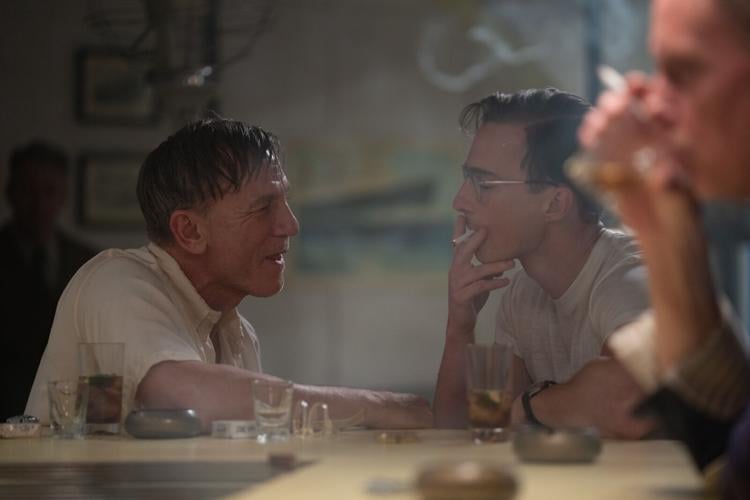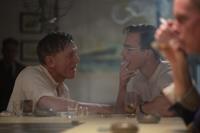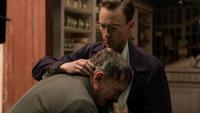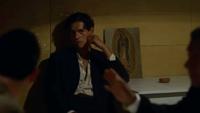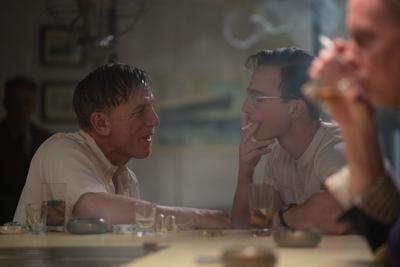This is an adaptation of the 1985 novella by William S. Burroughs. To appreciate it fully, one has to know Burroughs' writing, as well as major incidents in his life already. A lot of Burroughs' work has semi-autobiographical elements. The characters and events are based or at least inspired by things in his life. It's highly fictionalized and blurred together, but if one didn't know about Burroughs' personal ups and downs, one might struggle to find much meaning here. What I gathered is that this film and likely the novella were an examination or questioning of what it means to be or what's involved in being that titular word. One of the first lines of dialogue from the protagonist is, "Are you queer?"

Daniel Craig (Knives Out and Casino Royale) stars as William Lee, the Burroughs equivalent or surrogate. He's a writer who has enough money to live comfortably in Mexico, likely having left the United States because he couldn't live as openly gay as he can in Mexico. In real-life, Burroughs did move to Mexico in 1950, but it was because he was on the run from the law. Burroughs had been arrested for drug and weapons charges in New Orleans, but he was able to flee in order to escape prison. Burroughs was in his mid 30's at the time. Here, Craig is in his mid 50's, so Craig's William Lee or just "Lee" isn't exactly facing what Burroughs was facing. What the real-life Burroughs was facing was arguably more interesting, which isn't a complaint here, but the film does incorporate other real-life elements of Burroughs' life. While in Mexico, he did pursue relationships with men, and it's not as if gay men didn't face problems south of the border, but Lee seems more free to walk the streets, go from bar to bar, not having to hide who he is or his sexuality. He's the one who asks, "Are you queer?" While he's able to be openly gay, not everyone else does or feels as bold as him. His main goal, therefore, is first sussing out who is straight and who isn't, and second, navigating a relationship or simply an affair with a man who might not be as open as him.
Drew Starkey (Outer Banks and Love, Simon) co-stars as Eugene Allerton, a former U.S. military service member, either in the Army or Navy. It's not clear why he's in Mexico, unless it's for the same reason as Lee. He could be there to explore his sexuality in a place that perhaps is a bit safer. He could be looking for something different. There seems to be a community of American expats and Eugene like Lee has connected with them. There also seems to be a gay community in Mexico with whom Eugene has also connected, but there's no confirmation of Eugene's sexuality specifically. The first reel or so of this film is Lee trying to determine if Eugene is gay or not. Eugene is obviously attracted to Lee and Eugene becomes the object of Lee's affections.

This film suggests that beyond the lust and hot oral sex, there might be more. The film suggests that Lee might be in love with Eugene. If so, the film fails to explain why Lee might be in love beyond the superficial. However, there's another suggestion that Lee might simply be infatuated and obsessed in which case this film isn't a love story but one of a desperate and drug-addicted man, chasing after a fix. Instead of that fix being heroin or some other narcotic, the fix might be some kind of intimacy with Eugene. Even that theory still suggests that Eugene is something special. Prior to hooking up with Eugene, Lee has sex with a Latino man, played by Omar Apollo, the Mexico-American pop star. Lee is able to get his fix, but he obsesses over Eugene for some reason. The film is resolutely in the point-of-view of Lee, so we don't get much delving into Eugene's mind. The film makes Eugene rather distant or aloof, not very verbal or as verbal as Lee, so not many opportunities are presented to get Eugene's perspective.
Director Luca Guadagnino makes the majority of this film's second half an odyssey of sorts. Lee and Eugene go to South America to find a hallucinogenic drug. Spoiler alert! They find the drug and both have a freaky hallucination. Beyond Guadagnino wanting to have a freaky hallucination in the film or honoring what was perhaps in the novella, I failed to see the point of it. The best I could gather is showing the ridiculous lengths gay men might go just for a connection, even one as bizarre as a freaky hallucination. That hallucination tried to give The Substance (2024) a run for its money, but isn't as freaky as that Demi Moore horror film.

Finally, I didn't like the anachronistic music cues or needle drops throughout the film. I also got frustrated over the sound mixing, which over and over again had those music cues come to an abrupt halt. There is one scene that is a pull from an incident from Burroughs' life, specifically a shooting. The person who got shot and killed in Burroughs' real life isn't the person shot and killed here, but again, I failed to see the point of it.
Rated R for strong sexual content, graphic nudity, drug content, brief violence and language.
Running Time: 2 hr.s and 16 mins.
In theaters.

